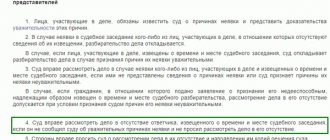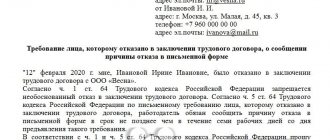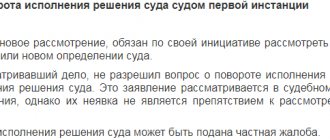The concept of an objection to a claim
The proceedings of any civil case are based on the principles of adversarialism and equality of plaintiff and defendant. This means that they have the same rights so that each of them can prove to the court the validity of his position. The court makes a decision in favor of the party that provides more evidence. The court itself does not collect them on its own initiative.
Therefore, having familiarized yourself with the provisions of the statement of claim, if you disagree with them, you can begin to draw up this document. This is expressly stated in clause 2, part 2, art. 149 Code of Civil Procedure of the Russian Federation. An objection to the statement of claim can be filed not only by the defendant, but also by other participants in the process (third parties with or without independent claims).
It is drawn up in writing and contains the position of the defendant on all issues with which he does not agree completely or in some part.
Refusal of a claim by an arbitration court based on the defendant's response
Announcement of a court decision Just the other day we wrote how and why to prepare a response to a statement of claim to an arbitration court, and today I would like to show with a clear example why a professional approach to any issue is simply necessary.
The statement of claim was already in court when our regular client contacted us and asked us to take an active part in the process. The essence of the dispute was that the buyer (plaintiff) and supplier (defendant, our principal) agreed on the supply of equipment for a total amount of just over 1.5 million rubles without signing a contract. The buyer made an advance payment of 570 thousand rubles, after which he refused to supply the goods. However, the supplier has already ordered the necessary equipment from the manufacturer and even received it at the warehouse. The buyer filed a lawsuit demanding the return of what he believed was unjust enrichment. The position that our client suggested we take—that he suffered losses—was completely unsuitable for the successful completion of the case. Therefore, we have developed a comprehensive, in some cases even a practical legal position, that the parties have actually entered into a purchase and sale (supply) agreement by issuing an invoice and a payment order. After a long debate, the judge accepted our side as based on the provisions of the law and completely rejected the claim.
I invite the reader to familiarize himself with the legal position we have developed on the dispute.
Arbitration Court of the Moscow Region 107053, Moscow, Akademika Sakharov Ave. 18
Plaintiff: Sodrugestvo LLC 141551, Moscow region, Solnechnogorsk district, Goluboe village, 2
Defendant: Vodnaya Tekhnika LLC 143005, Moscow region, Odintsovo, st. Transportnaya, 2 B
Case No. A41-54491/2018
REVIEW to the statement of claim
Sodrugestvo LLC (hereinafter referred to as the Plaintiff) filed a claim with the Arbitration Court of the Moscow Region against Vodnaya Tekhnika LLC (hereinafter referred to as the Defendant) for the recovery of unjust enrichment.
The Claimant's claims are motivated by the fact that the Claimant, in his opinion, in the absence of contractual obligations, made a partial payment in the amount of 40%, which amounted to 571,719.69 rubles, according to invoice No. 105469 dated December 21, 2017. In this regard The Plaintiff believes that the amount paid should be returned by the Defendant as unjust enrichment.
The defendant does not agree with the stated requirements, considers them to be unfounded and not subject to satisfaction for the following reasons.
In December 2021, through oral negotiations, the Plaintiff and the Defendant agreed to enter into an agreement for the supply of the sewage pumping unit “Multilift MD 38.3.2.” in the amount of four pieces.
In accordance with Part 1 of Art. 434 of the Civil Code of the Russian Federation, an agreement can be concluded in any form provided for transactions, if the law does not establish a specific form for agreements of this type. If the parties agreed to conclude an agreement in a certain form, it is considered concluded after giving it the agreed form, even if the law did not require such a form for contracts of this type. Part 2 of the same article states that a written agreement can be concluded by drawing up one document signed by the parties, as well as by exchanging letters, telegrams, telexes, telefaxes and other documents, including electronic documents transmitted via communication channels, allowing one to reliably establish that the document comes from a party to the contract.
As the Plaintiff correctly points out, the contract for the supply of the specified Goods in the form provided for in Part 2 of Art. 434 of the Civil Code of the Russian Federation, in the form of one document signed by the parties, was not drawn up.
The plaintiff believes that in the absence of a single document specified in Part 2 of Art. 434 of the Civil Code of the Russian Federation, the contract for the supply of Goods must be considered not concluded.
The Claimant's stated argument is untenable and is based on an incorrect interpretation of the rules of substantive law due to the following.
According to Art. 432 of the Civil Code of the Russian Federation, a contract is considered concluded if an agreement is reached between the parties, in the form required in appropriate cases, on all the essential terms of the contract.
Essential are the conditions on the subject of the contract, the conditions that are named in the law or other legal acts as essential or necessary for contracts of this type, as well as all those conditions regarding which, at the request of one of the parties, an agreement must be reached.
An agreement is concluded by sending an offer (offer to conclude an agreement) by one of the parties and its acceptance (acceptance of the offer) by the other party.
At the same time, the party that has accepted full or partial performance under the contract from the other party or has otherwise confirmed the validity of the contract does not have the right to demand recognition of this contract as not concluded if the statement of such a demand, taking into account specific circumstances, would contradict the principle of good faith (clause 3 of Article 1).
In accordance with Part 1 of Art. 435 of the Civil Code of the Russian Federation, an offer is an offer addressed to one or more specific persons, which is quite specific and expresses the intention of the person who made the offer to consider himself to have entered into an agreement with the addressee who will accept the offer. The offer must contain the essential terms of the contract.
By virtue of Part 1, 3 Art. 438 of the Civil Code of the Russian Federation, acceptance is the response of the person to whom the offer is addressed about its acceptance. Acceptance must be complete and unconditional.
The performance by the person who received the offer, within the period established for its acceptance, of actions to fulfill the terms of the contract specified in it (shipment of goods, provision of services, performance of work, payment of the appropriate amount, etc.) is considered acceptance, unless otherwise provided by law, other legal acts or not specified in the offer.
In accordance with Article 506 of the Civil Code of the Russian Federation, under a supply contract, a supplier-seller engaged in business activities undertakes to transfer, within a specified period or terms, the goods produced or purchased by him to the buyer for use in business activities or for other purposes not related to personal, family, home and other similar uses.
The rules of Article 506 of the Civil Code of the Russian Federation do not establish any requirements for the essential terms of the supply agreement; therefore, by virtue of paragraph 3 of Article 455, the terms of the supply agreement are considered agreed upon if the agreement allows determining the name and quantity of the goods (Resolution of the Presidium of the Supreme Arbitration Court of the Russian Federation dated February 14, 2012 No. 12632/11 in case No. A12-19573/2010).
In the present case, on December 21, 2017, the Defendant sent the Claimant an invoice for payment No. 105469 dated December 21, 2017 for the supply of the sewage pumping unit “Multilift MD 38.3.2.” in the amount of four pieces, which was received by the Plaintiff.
The above circumstances are not disputed by the Claimant; they are directly confirmed by the arguments set out in the statement of claim and the evidence attached to it.
Thus, the Defendant made an offer to the Plaintiff (sent an offer) to enter into a supply agreement on the following terms:
- product name: sewage pumping unit “Multilift MD 38.3.2.”;
- quantity of goods: four pieces;
- product price: RUB 1,429,299.22
Taking into account the position of the Presidium of the Supreme Arbitration Court of the Russian Federation, set out in the above-mentioned Resolution of the Presidium of the Supreme Arbitration Court of the Russian Federation dated February 14, 2012 No. 12632/11 in case No. A12-19573/2010, the offer addressed by the Defendant to the Plaintiff contained all the essential terms of the supply agreement and expressed the intention of the Defendant consider yourself to have entered into an agreement with the Plaintiff in the manner prescribed by Part 1 of Art. 435 of the Civil Code of the Russian Federation.
The plaintiff, in turn, made a partial payment under payment order No. 694775 dated December 21, 2017 in the amount of 40%, which amounted to RUB 571,719.69.
The above circumstances are also not disputed by the Plaintiff; they are directly confirmed by the arguments set out in the statement of claim and the evidence attached to it.
Also, the Plaintiff, in his statement of claim, connects the payment made under payment order No. 694775 dated December 21, 2017 directly with the previously received invoice for payment No. 105469 dated December 21, 2017; in the statement of claim and the invoice itself he directly indicated that he made a partial payment on this account. The Plaintiff in the statement of claim does not refer to the fact that the payment was made erroneously, or that there were other circumstances that may indicate the Plaintiff’s lack of will to conclude the transaction.
Consequently, the Plaintiff consciously accepted the offer previously sent to him in the manner provided for in Part 3 of Art. 438 of the Civil Code of the Russian Federation, thereby committing conclusive actions expressing his will to conclude a deal on previously proposed conditions.
Thus, the parties have entered into a contractual relationship, and the written form of the transaction is considered to be complied with.
In accordance with Part 1 of Art. 1102 of the Civil Code of the Russian Federation, a person who, without the grounds established by law, other legal acts or transaction, acquired or saved property (acquirer) at the expense of another person (victim), is obliged to return to the latter the unjustly acquired or saved property (unjust enrichment), except for the cases provided for Article 1109 of this Code.
Within the meaning of Art. 1102 of the Civil Code of the Russian Federation, enrichment may be recognized as unjustified if there are no legal grounds provided for by law for the acquisition or saving of property. For such reasons, by virtue of Art. 8 of the Civil Code of the Russian Federation may include acts of state bodies, local government bodies, transactions and other legal facts ( Definition of the Supreme Court of the Russian Federation dated January 26, 2010 N 71-B09-15 ).
In this case, the basis for partial payment under payment order No. 694775 dated December 21, 2017 was the Plaintiff’s obligations to pay for the goods under the supply agreement concluded in the manner prescribed by Part 2 of Art. 432, art. 435, part 3 art. 438, art. 506 of the Civil Code of the Russian Federation, in connection with which obligations did not arise as a result of unjust enrichment.
The buyer’s obligations, on contractual terms, to pay in full for the goods and to take all necessary actions for acceptance of the goods are established, respectively, in Part 1 of Art. 516 and part 1 of Art. 513 of the Civil Code of the Russian Federation .
According to the Defendant’s invoice No. 105469 dated December 21, 2017, which represents an offer accepted by the Plaintiff, delivery of the goods is carried out after full payment.
On the day the partial payment was received, the Defendant ordered equipment from and on February 12, 2018, according to delivery note No. 6750147658, the ordered equipment arrived at the warehouse of Vodnaya Tekhnika LLC. By payment order No. 1248 dated March 26, 2018, the Defendant paid for the goods, including those ordered by the Plaintiff. In addition, the ordered product is highly specialized and it is extremely difficult to sell it to other customers.
Refusal of the buyer from the supply contract in accordance with Art. 523 of the Civil Code of the Russian Federation is permitted only in the event of a significant violation by one of the parties. The Plaintiff does not allege any violations committed by the Defendant since such violations could not have occurred until he paid for the goods in full.
From the above it follows that the Plaintiff knowingly exercised his civil rights in bad faith (abuse of rights), which, according to Part 1 of Art. 10 of the Civil Code of the Russian Federation is not allowed.
Thus, the Plaintiff unlawfully evades fulfillment of two obligations under the concluded transaction: full payment and receipt of the ordered goods, and the stated claim for the return of partial advance payment is not based on the law.
Consequently, the claims stated by the Plaintiff cannot be satisfied.
Based on the above, as well as in accordance with Art. 131 Arbitration Procedural Code of the Russian Federation,
ASK:
The claims of Sodruzhestvo LLC against Vodnaya Tekhnika LLC for the recovery of unjust enrichment shall be rejected.
Attachment – a copy of the representative’s power of attorney 1l.
September 4, 2021
Representative by power of attorney: ________________/ Sukhanov D.V.
Reasons for filing an objection
What could be the reason for submitting it?
The reasons that prompted the defendant to prepare a response to the statement of claim and object to the claims brought against him can be very diverse:
- complete disagreement with the plaintiff's position. The defendant can prove the absence of his guilt in causing damage in all possible ways (submission of documents, conducting an examination or inviting witnesses to testify);
- partial disagreement with the plaintiff's arguments. For example, the defendant admits that he is guilty of causing damage to the plaintiff, but objects to the amount claimed for recovery. In this case, without contesting his guilt, he can submit calculations to determine the amount of damage, supporting them with various certificates and other documents;
- indication of procedural violations. In this case, the issue of the defendant’s guilt is not discussed, but emphasis is placed on the incorrect application of the provisions of the Code of Civil Procedure of the Russian Federation, which impede the legal consideration of a civil case. For example, provisions regarding an improper defendant, incorrect determination of the jurisdiction of the case, the expiration of the statute of limitations, or payment of the state duty not in full.
Sample application for refusal of claim
To avoid difficulties in filling out the document or possible rejection by the court and closure of the case due to incorrect execution, rely on ready-made templates.
The standard form assumes the presence of a “header” indicating the recipient and sender, a main part describing the essence of the petition and references to regulations, conclusions with a signature and date.
An example application can be downloaded from the link on our website:
The legislation does not prohibit the applicant from abandoning the initially presented claims. However, the decision must be made carefully. If further continuation of legal proceedings is inappropriate due to various circumstances, you can terminate the case at your own request. In this case, it will be impossible to repeatedly demand similar compensation from the defendant.
How and within what time limit is an objection filed?
It is worth approaching the preparation of an objection to a claim with all responsibility. After all, it can be regarded as a way to protect the rights and interests of the defendant. It is submitted to the court that is considering the case. You can present it in person at the court hearing, leave it in the court office, or send it in advance by mail. If these actions are performed by another person on your behalf, then issue a power of attorney for him at a notary office. The main thing is to have time to do this before the court decision is made.
An objection should be prepared according to the number of persons participating in the case and one copy should be prepared for the court to attach it to the materials of the civil case. It is also accompanied by all documents that can confirm the arguments presented.
Not only participants in civil proceedings have the right to file an objection to a claim. It is also provided for in the consideration of arbitration cases.
The court may not accept the application
There are several conditions due to which, if the plaintiff files a waiver of the claim, the court may reject the application. In particular:
- The court will not approve the waiver of the claim and the settlement agreement of the parties if civil rights are violated or this decision is contrary to the law;
- A refusal in the court of cassation is not accepted - a petition can only be sent to the courts of first and appellate instances.
- The application was made with errors or was not in proper form.
The applicant must make a decision to withdraw claims against the defendant independently, without outside pressure. The appeal does not have to indicate the reasons for moving to a peace agreement, however, these provisions will simplify the decision on the current legal proceedings. If it is revealed that the person was forced to file the relevant application, the request may be rejected by the judge.
The difference between an objection, a counterclaim and a revocation
It should not be confused with a counterclaim. Its content is limited to a refutation or specification of the main provisions of the claim. It cannot present other independent requirements to the plaintiffs. If the plaintiff also has claims of a material or other nature, they should be filed in the form of a counterclaim. It is drawn up according to the same rules as the claim itself. Its submission is accompanied by payment of a state fee.
Often, defendants prepare a response to the claim in court. In it they can present only those circumstances that are directly related to the case materials. It is drawn up even if the defendant agrees with the plaintiff’s arguments, but in the event that there is a need to clarify certain points or supplement them.
The procedure for filing and considering an application for waiver of a claim
In most cases, participants in the process come to a settlement by withdrawing claims in the following situations:
- disclosure of previously unknown factors in the case;
- before the completion of the case, the defendant voluntarily paid compensation in accordance with the stated requirements;
- the costs of conducting the case exceed the amount of potential compensation;
- interest in continuing legal proceedings has been completely lost.
Filing a petition is allowed during the legal process - from the beginning of the consideration of the case until the adoption of the final decision. Depending on the type of court case, participants rely on the relevant procedural codes of the Russian Federation:
- The procedure for abandoning a lawsuit in civil proceedings and consideration of the corresponding application is fixed by the provisions specified in Art. 173 Code of Civil Procedure of the Russian Federation and Art. 39 clause 1 of the Code of Civil Procedure of the Russian Federation;
- in the arbitration process, the provisions for waiving a claim are specified in Art. 49 clause 2 of the Arbitration Procedure Code of the Russian Federation.
A request to dismiss a filed claim may be accepted in written or oral format. In the first case, the plaintiff independently submits an application to the court before the case is completed. In the second, he voices his own wishes at the court hearing, which is recorded in the protocol.
The general procedure for waiving claims can be presented as follows:
- The plaintiff sends a corresponding petition.
- The judge clarifies with the applicant the reasons for withdrawing the claims.
- The court considers the received request.
- A decision is made to terminate or continue the case.
A citizen may not withdraw all initially stated claims against the defendant, but only waive part of the claims. In this case, a reduction in the amount of monetary compensation is implied.
READ Drawing up and filing a claim to reduce the amount of alimony
Contents of the objection
The objection to the statement of claim should be brief, but at the same time meaningful. Since it will be in a civil case, and when checking the legality of the decision made, supervisory authorities will become familiar with its text, approach its writing with all responsibility. The law does not contain direct instructions regarding its content. When preparing it, it is advisable to adhere to the following structure, which has developed in practice:
- name of the judicial authority;
- information about the defendant or third party on whose behalf the objection is being filed;
- information about the case number and its parties;
- Statement of your objections with reference to laws and evidence. Specifically indicate which provisions of the claim are unfounded;
- a request to the court to refuse (full or partial) to satisfy the plaintiff’s claims;
- list of attached documents;
- date of preparation and signature of the objector.
A competently and concisely drawn up objection will help the judicial authorities clearly understand the defendant’s position and analyze it. This will help achieve a positive outcome for the defendant. A sample objection to a statement of claim can be downloaded on the Internet or you can read its contents on information boards in courts.
Consequences of the settlement agreement
According to the civil and arbitration procedural codes of the Russian Federation, the plaintiff’s refusal of a lawsuit presupposes a voluntary settlement of the conflict. Accordingly, each party, without coercion, chooses a settlement agreement. Once the judge confirms acceptance of the request, the case is considered closed.
In this case, the main consequence of abandoning a claim in arbitration or civil proceedings is the inability to resume a similar case. The plaintiff will be able to re-state claims in court only if the subject and basis of the claim change.
READ Application to court to amend claims - sample








